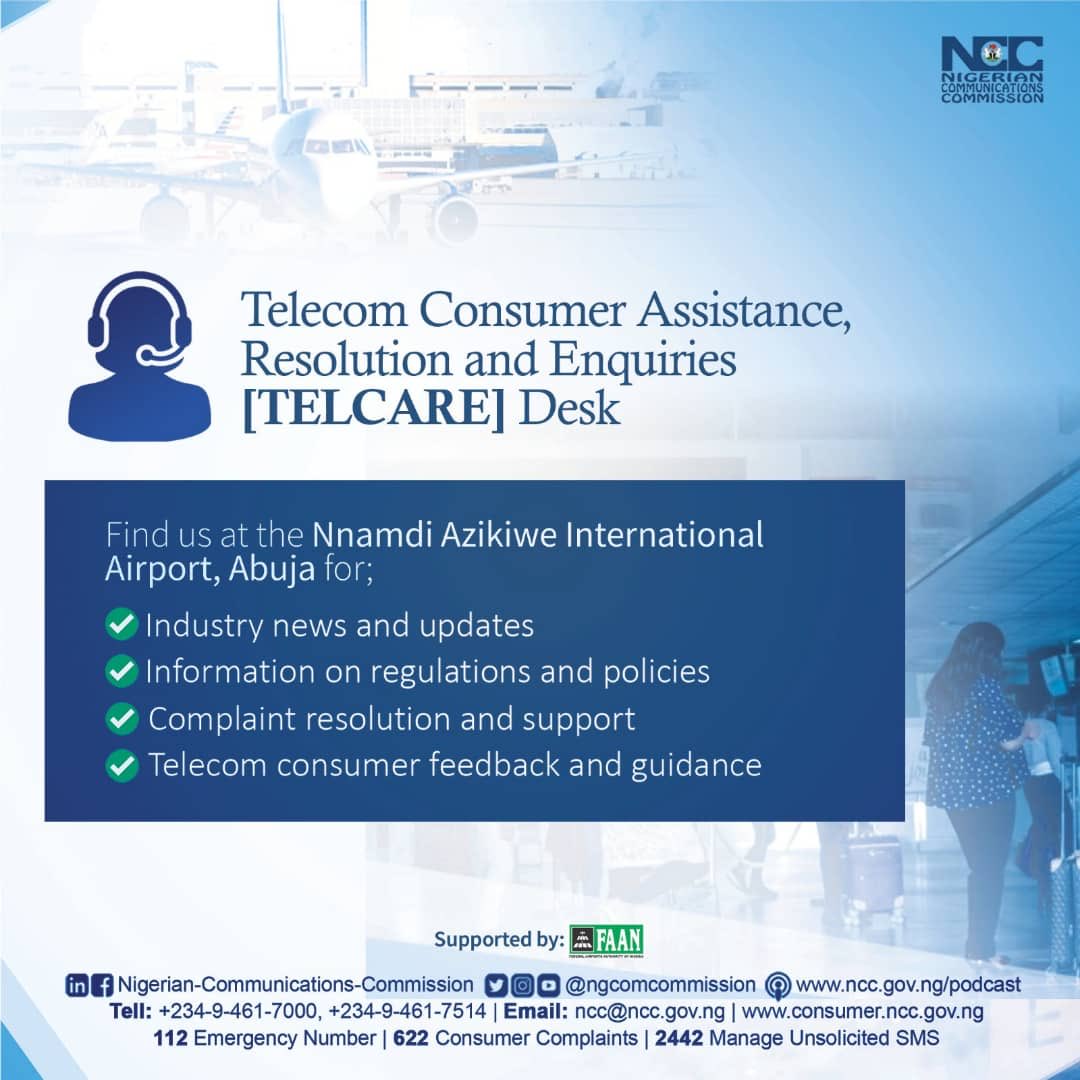The Nigeria Communications Commission (NCC) has launched Telecom Consumer Assistance, Resolution, and Inquiries (TELCARE), with the Nnamdi Azikiwe International Airport in Abuja being the first to benefit.
This was revealed recently in a statement issued by the commission’s Director of Public Affairs, Reuben Muoka.
The TELCARE Desk was established in the Nnamdi Azikiwe Airport’s Arrival Lounge as a telecom consumer support, resolution, and questions desk as part of activities marking the 2023 World Consumer Rights Day, which was marked last week.
Umar Danbatta, NCC’s Executive Vice Chairman/Chief Executive Officer, noted that the TELCARE desk is an effective platform for receiving and resolving consumer complaints, as well as giving a mechanism for consumers and citizens to enquire about consumer issues.
He also stated that the commission’s Consumer Affairs Bureau (CAB) platform would take advantage of the chance to educate telecom users about other measures targeted at improving the environment for all humanity.
Read also: NCC insists on approved short codes implementation for (MNOs)
Public offices to be adorned with TELCARE
The Chairman Board of Commissioners of NCC, Prof. Adeolu Akande, who unveiled the initiative, said the launch of the TELCARE at the international airport is the starting point of the helpdesk project, which will be distributed across airports and other public locations in the country.
According to him, the desk would serve as a means for consumers to make inquiries and suggestions, allowing the commission to provide advocacy on consumer concerns as well as create awareness regarding the commission’s activities.
“The project is a deliberate effort by the Commission to amplify its commitment to promoting the interest of consumers using various engagement strategies and initiatives to protect, inform, and educate telecom consumers.” Akande said.
The Head of the Consumer Affairs Bureau of the commission, Ayanbanji Ojo, noted that consumers are already taking advantage of the TELCARE Desk, even before the launch at the airport, to make enquiries or lodge complaints.
“This is a pilot project, and the Commission will ensure that the TELCARE Desk is established in more strategic locations around the nation. We believe that through adequate education, information sharing, and the provision of layers of channels for complaints and redress, we can safeguard the interest of telecom consumers and innovatively promote the prospect of more excellent consumer experience.” He said.
The Regional General Manager of the Federal Airports Authority of Nigeria, Kabir Mohammed, while expressing joy about its collaboration with the NCC on the new initiative, noted that the first-hand interface with consumers would not only expedite the feedback mechanism in addressing telecom consumer issues but also curb unfair practices within the system and further bridge any communication gap between the consumers and its regulators.
The Consumer Education mandate
Danbatta noted that the Consumer Affairs Bureau (CAB) of the NCC will improve on its Consumer Education mandate, with significant effort dedicated to providing information that equips the consumer to thrive in a world that has embraced digital finance.
“We are committed to responsibly using the world’s resources, including protecting the environment by supporting the industry to transition to renewable energy. Through its outreach programmes, which have continued to re-tool to reflect existing realities and trends, the CAB will use its consumer-centric initiatives such as the Telecom Consumer Parliament (TCP), Telecom Consumer Town Hall on Radio (TCTHR), Telecom Consumer Conversations (TCC) as well as social media platforms and Consumer Portal to sensitize consumers on how renewable energy benefits them and their role in achieving industry transition to it in the interest of the environment.” He said.
The NCC CEO expressed hope that the CAB will develop and produce various consumer education materials such as Flexi and Roll-up Banners and Handbills and update its Consumer Handbook to include the message about renewable energy.
“With the rising utility costs, it is critical for companies to reconsider the sustainability of their operations by lowering the operational impact on the environment. This is more so because it has been found that implementing energy efficiency measures could potentially reduce the operating costs of telcos by up to 20 per cent,” he said.
He also noted that some of these energy-efficiency measures include the redesign of the Radio Access Networks (RAN) of Base Stations, which were initially built to maximize connectivity.
“More than 75 percent of the time, the radio base station resources remain unused because of the hardware components activated at all times to transmit system information and synchronisation and reference signals.
“Therefore, to avoid waste heat, some of 5G’s newest RAN is equipped with an energy-saving measure allowing for the automatic switching of components. Some other energy efficiency measures can also include the use of renewable energy sources (hydrogen, wind, solar etc.) to supply the energy needed,” he said.




